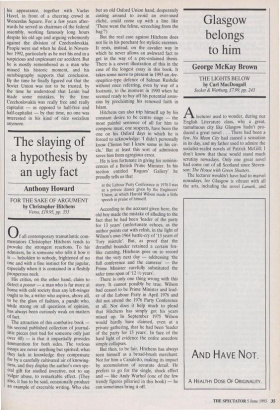Glasgow belongs to him
George McKay Brown
THE LIGHTS BELOW by Carl MacDougall Secicer & Warburg, £7.99, pp. 243 Alecturer used to wonder, during our English Literature class, why a great, tumultuous city like Glasgow hadn't pro- duced a great novel . . . There had been a few. No Mean City had caused a sensation in its day, and my father used to admire the socialist-realist novels of Patrick McGill; I don't know that these would stand much scrutiny nowadays. Only one great novel had come out of all Scotland since Steven- son: The House with Green Shutters.
The lecturer wouldn't have had to marvel nowadays, for Glasgow is vibrant with all the arts, including the novel Lanark, and James Kelman's books, and William MacIlvaney, and Moira Burgess. A new Glasgow novelist, Carl MacDougall, came on the scene in 1989 with Stone Over Water, a well-made novel. His art has taken a great stride forward with a second novel, The Lights Below. It seems to me to be a masterpiece — in fact one of the great Scottish novels of this century.
It is, in a way, a detective story. A young man, Andy Paterson, has just been released from prison on a drugs charge of which he is innocent; he wants to know why he was framed, and by whom. The huge city has changed a lot since Andy was put away; he has to attune himself to the new rhythms, a painful business. He isn't a tough guy — in fact he is an intelligent young man with a love of books and music.
He goes first to his own people, and at once MacDougall introduces us to an astonishingly vivid group of characters, sis- ter Eileen, and brother-in-law Joe Sweeney, and Granny, who sells cardboard boxes for homeless people to live in, and Granny's friend, Orlando.
The whole city begins to vibrate: a living web out from this one tragi-comic family to include anyone and everyone who is touched by the story. The novel is as much a celebratory portrait of modern Glasgow as of Andy Paterson. (I have never spent more than the occasional night in Glasgow; from this novel any stranger, set down in it, would recognise it). It is palpable to all the senses. The dialogue is magnificent: Glasgow, like Dublin, is a city of vivid speech — there's a bit of a poet in every working-class citizen. MacDougall has caught the patter wonderfully.
Andy himself is a firmly drawn, rounded character, a kind of late-20th-century Ham- let longing for, and yet flinching from, the truth. But the most memorable character of all is his grandmother, who is a female Falstaff. Her parties are wonderful, every bit as good as the Boyles' party in Juno and the Paycock, with the Orange lady singing anti-papist songs and the Catholic woman crushing her with full-throated Fenian bal- lads; but in the end no ill-feeling; the danc- ing and the drinking go on. And the wonderful Granny sits in the centre of this thrumming web.
Half way into the novel, Andy finds a girl, Edna; and he deserves this earnest, intelligent young woman because his earli- er, ill-considered marriage was not a suc- cess on any level. (He ought to have listened to his wise Granny's cautions.) The first wife was a flat, dull woman; but in the end she turns out to be a bit more exciting than she seemed originally. In fact, the sin- ister thread leads through her to the wrongful imprisonment of Andy. The thread is put into Andy's hand by another vivid character, the lawyer Fenian McGuire. And all the time this marvellous Glaswegian dialogue is weaving like music through the tale.
It is a beautifully constructed story throughout (with a subplot that doesn't get in the way of the main action: the murder, before it all began, of Andy's father, and the marriage of the murderer with his mother — Hamlet again). Having found out the truth, Andy, like Hamlet, acts ruthlessly and swiftly, with a catharsis of fire. He will make a new beginning with his Edna.
Glasgow has a major new novelist with Carl MacDougall, no doubt about it.



























































 Previous page
Previous page